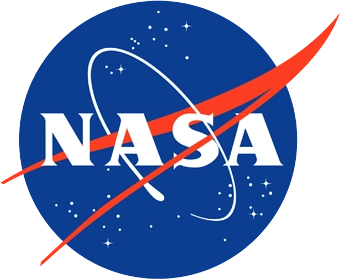Early Career Scientist Spotlight
Dr. Daniel Violette (he/him/his)
High-Energy Astrophysicist
Astroparticle Physics Laboratory (661)
What inspired you to pursue a career in Astrophysics?
I was always a huge nerd growing up and loved to read science fiction and play space exploration-themed video games. I always thought the scientist characters were the coolest! While I was interested in a career in astrophysics, I hedged my bets and started my undergraduate degree at the University of Connecticut as an engineering student. It was only after I had the opportunity to start interning at NASA in 2011 working with Dr. Keith Gendreau and the Neutron star Interior Composition Explorer (NICER) mission that I started thinking about a career in astrophysics as a real possibility. After graduating with a degree in Engineering Physics and a couple more internships at NASA Johnson Space Flight Center and GSFC, I was hooked, and decided to pursue astronomy long-term! I then decided to pursue a PhD in astronomy and astrophysics.
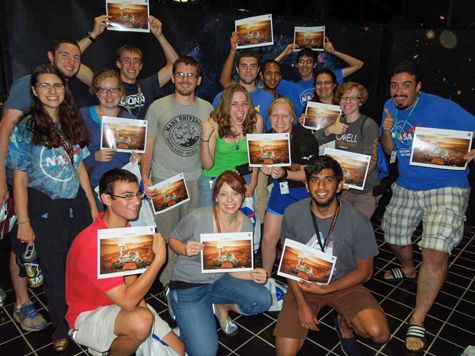
Credit: Aaron Silver
What science questions do you investigate?
I am very interested in developing technologies for future gamma-ray telescopes that can be leveraged for time-domain and multi-messenger astronomy. Multi-messenger astronomy relies on the coordinated observations of different signals, including electromagnetic radiation, gravitational waves and neutrinos, to learn more about some of the most energetic events in our universe, including supernovae (gamma-ray bursts) and compact object mergers (neutron stars and black holes). These brief events can occur anywhere in the sky, and telescopes with large fields of view allow us to pinpoint where they occur and promptly study the emission from these sources. To that end, I’m working with two wide-field gamma-ray instrument programs. BurstCube is a shoebox-sized CubeSat designed to monitor the full unocculted sky for gamma-ray bursts and to rapidly alert the astronomy community when they occur. It will be launched next year! Additionally, I am working on developing AstroPix, a silicon detector technology for a future gamma-ray telescope mission that, when layered in sheets, allows us to track high-energy photon interactions (Compton scattering and pair production) and reconstruct the location of where the photons originated in the sky.
Credit: NASA's Goddard Space Flight Center Conceptual Image Lab
What is one of your favorite moments in your career so far?
It’s very hard to pinpoint a favorite! I will say that my favorite type of moment happens after many hours of hard work designing, building, and programming hardware systems, when I watch them spring to life and return data for the first time. It’s such a gratifying moment! I can think of two specific examples. I once built a test stand to validate integrated circuit readouts for CdZnTe detectors, often used for high-energy astrophysics detectors. These integrated circuits were tough to test without bonding to a test board, but this stand allowed for rapid evaluation of these chips to confirm they worked. It required a fixture with very precise alignment to touch each one of the chip’s 87 connection points, separated by hundreds of microns. Lowering the test fixture onto the chip and watching it spring to life was a relief! Taking the detectors on the road is also a challenge. Going to a test facility like Argonne National Laboratory’s Advanced Photon Source also lets us learn more about how our detectors function in environments that we cannot create ourselves. After recreating our lab set-up in a new environment, it is always fun to watch our detectors work the way they were designed to. I’m very much looking forward to the launch of BurstCube next year!
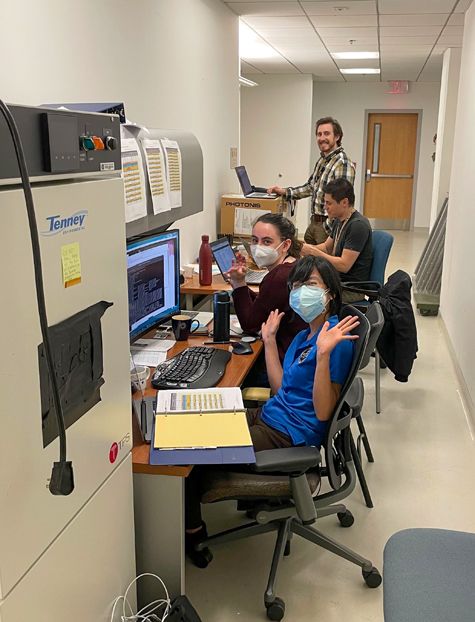
Credit: Lucia Tian/GSFC
What skills are most useful to you in your work, and where did you develop those skills?
As I’ve moved between stages in my career, I think that two very important skills one can have are adaptability and self-confidence. I think by exposing myself to many different situations and types of work throughout my career, I’ve become better at understanding how I learn and what kind of support I need to be successful when I’m working on a new project or idea. This has helped me build up a toolkit of more specific skills that often seem to become relevant again in future work.
The foundation of being adaptable to situations is having confidence in yourself to take on new challenges and to explore outside of your comfort zone. Confidence is also crucial in knowing when to ask for help. Not being afraid of asking questions or asking for support has helped me develop as a scientist and has helped me build up a network of knowledgeable mentors. I think self-confidence is very hard to develop and maintain, and it is a skill that scientists, myself included, can struggle with keeping honed. For me, the key to maintaining my belief in myself is my awesome family, friends, and mentors who support me.
What aspect of your work excites you the most?
One of the greatest parts about being a scientist is that you can participate in projects from their formulation until their conclusion. It’s exhilarating watching an idea that was at one point in your brain or on paper become something physical and real. I think that is what really draws me to space-based astrophysical instruments. You can watch these complex pieces of equipment come together and then, as a finale, blast them off into space to answer a myriad of puzzling questions about the universe, including the questions that spawned your idea in the first place.
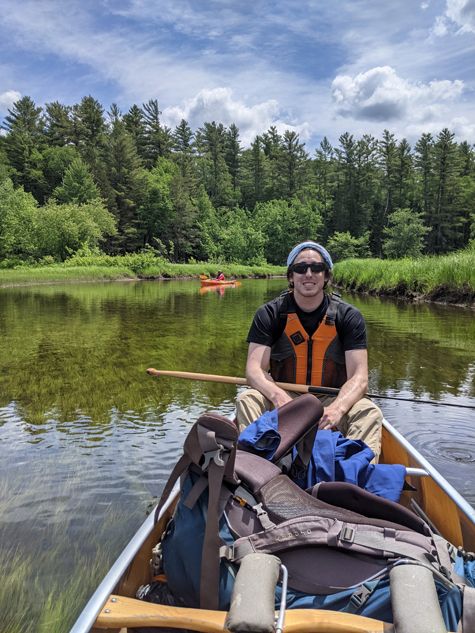
Credit: Kathryn McKeough
What do you like to do in your free time?
Ever since I was a kid in the Boy Scouts, I really liked being outdoors! Camping, backpacking, and hiking are all things I enjoy a lot. I also really like skiing, sailing, and rock climbing. I love to play board games and really enjoy playing role playing games like Dungeons and Dragons.
What are your future research interests and goals?
I really think the astrophysics community is just getting warmed up on multi-messenger astronomy, so I think there will be plenty to do to develop the next generation of instruments! While my career to-date has been focused on smaller programs and developing new technologies, I would love to play a role in larger astrophysics missions in the future! I honestly find so many fields of astronomy fascinating that I can’t rule out working on different types of instruments either, whether those turn out to be neutrino or gravitational wave observatories, or other parts of the electromagnetic spectrum. There is plenty to do!
Biography
Home Town:
Woodbury, CT
Undergraduate Degree:
B.S.E. in Engineering Physics, University of Connecticut, Storrs, CT
Post-graduate Degrees:
PhD in Astronomy and Astrophysics, Harvard University, Cambridge, MA
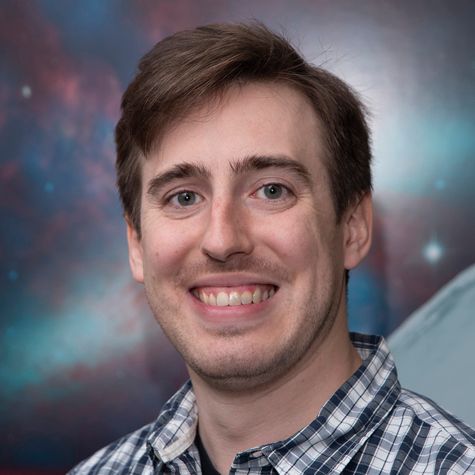
Link to Dr. Violette's GSFC Bio
